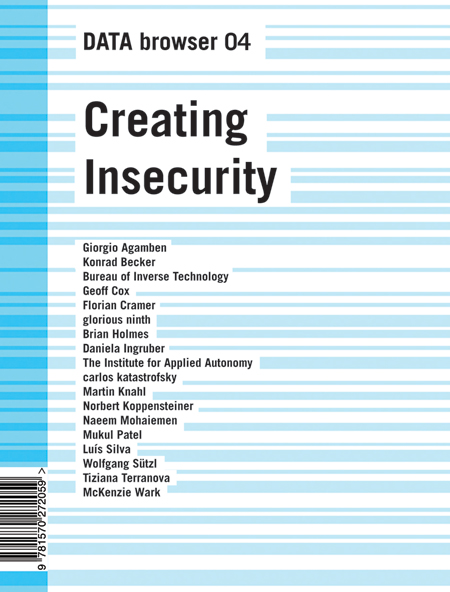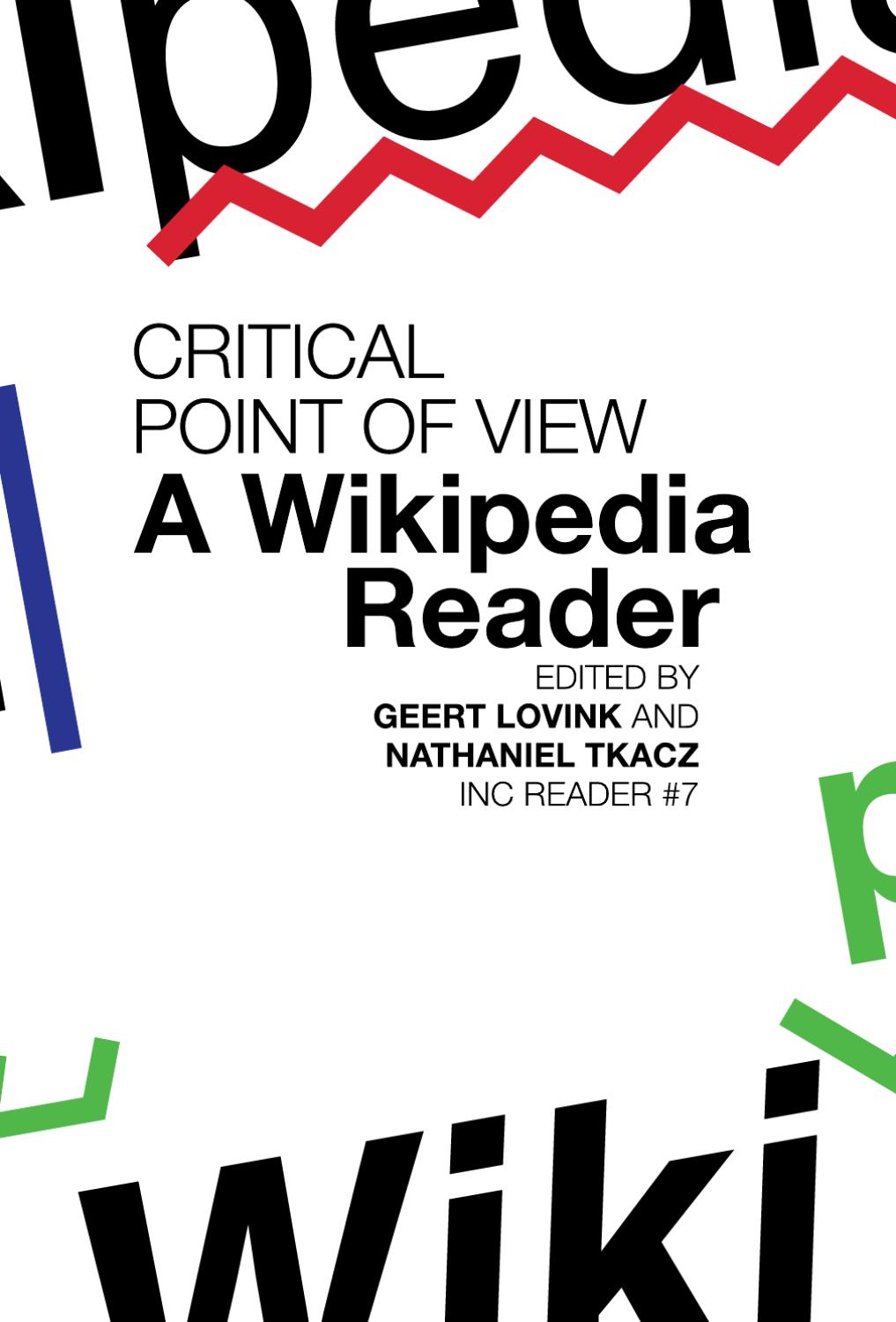Wolfgang Sützl, Geoff Cox (eds.): Creating Insecurity: Art and Culture in the Age of Security (2009)
Filed under book | Tags: · art, biopolitics, floss, free software, internet, knowledge, labour, open source, security, software, technology

“Today we are facing extreme and most dangerous developments in the thought of security. In the course of a gradual neutralization of politics and the progressive surrender of traditional tasks of the state, security imposes itself as the basic principle of state activity. What used to be one among several decisive measures of public administration until the first half of the twentieth century, now becomes the sole criterion of political legitimation. The thought of security entails an essential risk. A state which has security as its sole task and source of legitimacy is a fragile organism; it can always be provoked by terrorism to become itself terrorist.
Following the words of Giorgio Agamben (from his 2001 article “On Security and Terror”), security has become the basic principle of international politics after 9/11, and the “sole criterion of political legitimation.” But security — reducing plural, spontaneous and surprising phenomena to a level of calculability — also seems to operate against a political legitimacy based on possibilities of dissent, and stands in clear opposition to artistic creativity. Being uncalculable by nature, art is often incompatible with the demands of security and consequently viewed as a “risk,” leading to the arrest of artists, and a neutralization of innovative environments for the sake of security.
Yet precisely the position of art outside the calculable seems to bring about a new politicization of art, and some speak of art as “politics by other means.” Has art become the last remaining enclave of a critique of violence? Yet how “risky” can art be?”
Contributions from Giorgio Agamben, Konrad Becker, Bureau of Inverse Technology, Geoff Cox, Florian Cramer, glorious ninth, Brian Holmes, carlos katastrofsky, Martin Knahl, Norbert Koppensteiner, Daniela Ingruber, The Institute for Applied Autonomy, Naeem Mohaiemen, Mukul Patel, Luis Silva, Wolfgang Sützl, Tiziana Terranova, and McKenzie Wark.
Publisher Autonomedia/I-DAT, 2009
Creative Commons license
DATA browser series, 4
ISBN 9781570272059
208 pages
PDFs (updated on 2016-12-12)
Comment (0)Geert Lovink, Nathaniel Tkacz (eds.): Critical Point of View: A Wikpedia Reader (2011)
Filed under book | Tags: · collaboration, internet, knowledge, wikipedia

“For millions of internet users around the globe, the search for new knowledge begins with Wikipedia. The encyclopedia’s rapid rise, novel organization, and freely offered content have been marveled at and denounced by a host of commentators. Critical Point of View moves beyond unflagging praise, well-worn facts, and questions about its reliability and accuracy, to unveil the complex, messy, and controversial realities of a distributed knowledge platform.
The essays, interviews and artworks brought together in this reader form part of the overarching Critical Point of View research initiative, which began with a conference in Bangalore (January 2010), followed by events in Amsterdam (March 2010) and Leipzig (September 2010). With an emphasis on theoretical reflection, cultural difference and indeed, critique, contributions to this collection ask: What values are embedded in Wikipedia’s software? On what basis are Wikipedia’s claims to neutrality made? How can Wikipedia give voice to those outside the Western tradition of Enlightenment, or even its own administrative hierarchies? Critical Point of View collects original insights on the next generation of wiki-related research, from radical artistic interventions and the significant role of bots to hidden trajectories of encyclopedic knowledge and the politics of agency and exclusion.”
Contributors: Amila Akdag Salah, Nicholas Carr, Shun-ling Chen, Florian Cramer, Morgan Currie, Edgar Enyedy, Andrew Famiglietti, Heather Ford, Mayo Fuster Morell, Cheng Gao, R. Stuart Geiger, Mark Graham, Gautam John, Dror Kamir, Peter B. Kaufman, Scott Kildall, Lawrence Liang, Patrick Lichty, Geert Lovink, Hans Varghese Mathews, Johanna Niesyto, Matheiu O’Neil, Dan O’Sullivan, Joseph Reagle, Andrea Scharnhorst, Alan Shapiro, Christian Stegbauer, Nathaniel Stern, Krzystztof Suchecki, Nathaniel Tkacz, Maja van der Velden
Editorial Assistance: Ivy Roberts and Morgan Currie
Publisher: Institute of Network Cultures, Amsterdam, May 2011
INC Reader, 7
Creative Commons Attribution ShareAlike 3.0 Unported License
ISBN 9789078146131
385 pages
Gary Hall: Digitize This Book! The Politics of New Media, or Why We Need Open Access Now (2008)
Filed under book | Tags: · cultural studies, gift economy, internet, knowledge, open access, public domain, publishing, text, theory

“In the sciences, the merits and ramifications of open access—the electronic publishing model that gives readers free, irrevocable, worldwide, and perpetual access to research—have been vigorously debated. Open access is now increasingly proposed as a valid means of both disseminating knowledge and career advancement. In Digitize This Book! Gary Hall presents a timely and ambitious polemic on the potential that open access publishing has to transform both “papercentric” humanities scholarship and the institution of the university itself.
Hall, a pioneer in open access publishing in the humanities, explores the new possibilities that digital media have for creatively and productively blurring the boundaries that separate not just disciplinary fields but also authors from readers. Hall focuses specifically on how open access publishing and archiving can revitalize the field of cultural studies by making it easier to rethink academia and its institutions. At the same time, by unsettling the processes and categories of scholarship, open access raises broader questions about the role of the university as a whole, forcefully challenging both its established identity as an elite ivory tower and its more recent reinvention under the tenets of neoliberalism as knowledge factory and profit center.
Rigorously interrogating the intellectual, political, and ethical implications of open access, Digitize This Book! is a radical call for democratizing access to knowledge and transforming the structures of academic and institutional authority and legitimacy.”
Publisher University of Minnesota Press, 2008
ISBN 0816648719, 9780816648719
301 pages
PDF (updated on 2019-12-20)
Comments (3)
